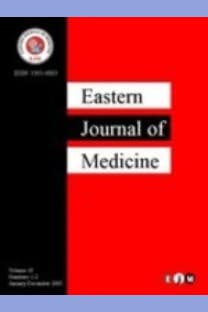Perioperative Results of Patients Undergoing Laparoscopic Cornual Resection and Cornuotomy in Cornual Pregnancy; Three Years Experiences of a Tertiary Referral Center
___
1. Lau S, Tulandi T. Conservative medical and surgical management of interstitial ectopic pregnancy. Fertil Steril 1999; 72: 207-215.2. Tulandi T, Al-Jaroudi D. Interstitial pregnancy: results generated from the Society of Reproductive Surgeons Registry. Obstet Gynecol 2004; 103: 47-50.
3. Soriano D, Vicus D, Mashiach R, et al. Laparoscopic treatment of cornual pregnancy: a series of 20 consecutive cases. Fertil Steril 2008; 90: 839-843.
4. Walker JJ. Ectopic pregnancy. Clin Obstet Gynecol 2007; 50: 89-99.
5. Lewis G, Drife J. Why Mothers Die 2000-2002. The Sixth Report of the Confidential Enquiries into Maternal Death in the United Kingdom. London, UK: RCOG Press; 2004.
6. Myung JK, Yong WJ, Jae-Ho C, et al. Successful management of heterotopic cornual pregnancy with laparoscopic cornual resection. European Journal of Obstetrics & Gynecology and Reproductive Biology 2016; 203: 199-203.
7. Cucinella G, Calagna G, Rotolo S, et al. Interstitial pregnancy: A „Road Map‟ of surgical treatment based on a systematic review of the literature. Gynecol Obstet Invest 2014; 78: 141-149.
8. Ng S, Hamontri S, Chua I, Chern B, Siow A. Laparoscopic management of 53 cases of cornual ectopic pregnancy. Fertil Steril 2009; 92: 448-452.
9. Damario MA, Rock JA. Surgery for obstetrics: ectopic pregnancy. In: Te Linde RW, Rock JA, Jones HW, editors. Te Linde‟s Operative Gynecology. 9th ed. Philadelphia, PA: LippincottWilliams &Wilkins 2003; 798-824.
10. Auslender R, Arodi J, Pascal B. Interstitial pregnancy: early diagnosis by ultrasonography. Am J Obstet Gynecol 1983; 15: 146: 717-718.
11. Timor-Tritsch IE, Monteagudo A, Matera C, Veit CR. Sonographic evolution of cornual pregnancy treated without surgery. Obstet Gynecol 1992; 79: 1044-1049.
12. Ackerman TE, Levi CS, Dashefsky SM, Holt SC, Lindsay DJ. An interstitial line: sonographic finding in an interstitial (cornual) ectopic pregnancy. Radiology 1993; 189: 83-87.
13. Lee MH, Im SY, Kim MK, Shin SY, Park WI. The comparison of laparoscopic cornual resection and cornuotomy for interstitial pregnancy. J Minim Invasive Gynecol 2017; 24: 397-401.
14. Wang J, Huang D, Lin X, et al. Incidence of interstitial pregnancy after in vitro fertilization/embryo transfer and the outcome of a consecutive series of 38 cases managed by laparoscopic cornuostomy or cornual repair. J Minim Invasive Gynecol 2016; 23: 739-747.
15. Watanabe T, Watanabe Z, Watanabe T, Fujimoto K, Sasaki E. Laparoscopic cornuotomy for interstitial pregnancy and postoperative course. J Obstet Gynaecol Res 2014; 40: 1983-1988.
16. Afifi Y, Mahmud A, Fatma A. Hemostatic Techniques for Laparoscopic Management of Cor nual Pregnancy: Double-Impact Devascularization Technique. J Minim Invasive Gynecol 2016; 23: 274-280.
17. Tulandi T, Vilos G, Gomel V. Laparoscopic treatment of interstitial pregnancy. Obstet Gynecol 1995; 85: 465.
18. Grobman WA, Milad MP. Conservative management of a large corneal pregnancy. Hum Reprod 1998; 13: 2002-2024.
19. Gleicher N, Karande V, Rabin D, Pratt D. Laparoscopic removal of twin cornual pregnancy after in vitro fertilization. Fertil Steril 1994; 61: 1161-1162.
20. Weissman A, Fishman A. Uterine rupture after conservative surgery for interstitial pregnancy. Eur J Obstet Gynecol Reprod Biol 1992; 13: 237- 239.
21. Karaman E, Gülaç B, Karaman Y, Hendem DU, Han A. The Management of Cornual Ectopic Pregnancy: Two Case Reports. İKSST Derg 2014; 6: 49-53.
- ISSN: 1301-0883
- Yayın Aralığı: 4
- Başlangıç: 1996
- Yayıncı: ERBİL KARAMAN
Pınar KADİROĞULLARI, Hüseyin KIYAK, Kerem Doğa SEÇKİN
Karan PONGPANİT, Chitima KULCHANARAT, Sasipa BURANAPUNTALUG, Kornanong YUENYONGCHAİWAT
Perforated Gastrıc Cancer: A Dıffıcult Challenge For The Surgeon
Treatment of Osteochondral Lesions of the Talus with Transmalleolar Open Mosaicplasty
Isolated Pneumopericardium After Penetrating Chest Injury
Coexistence of Autism and Ring Chromosome 22
Esra SİZER, Tuğba YÜKSEL, Diclehan ORAL
Relationship Between Vitamin D Deficiency and Chronic Tension-type Headache
Evaluation of Asterion Morphometry in Terms of Clinical Anatomy
Sinem AKKAŞOĞLU, Mine FARİMAZ, Hilal AKDEMİR AKTAŞ, Hakan OCAK, Ömür Dilek ERDAL, Mustafa Fevzi SARGON, Selma ÇALIŞKAN
Vedat ÇİLİNGİR, Ahmet DÖNDER, AYSEL MİLANLIOĞLU, Abdullah YILGÖR, Temel TOMBUL
